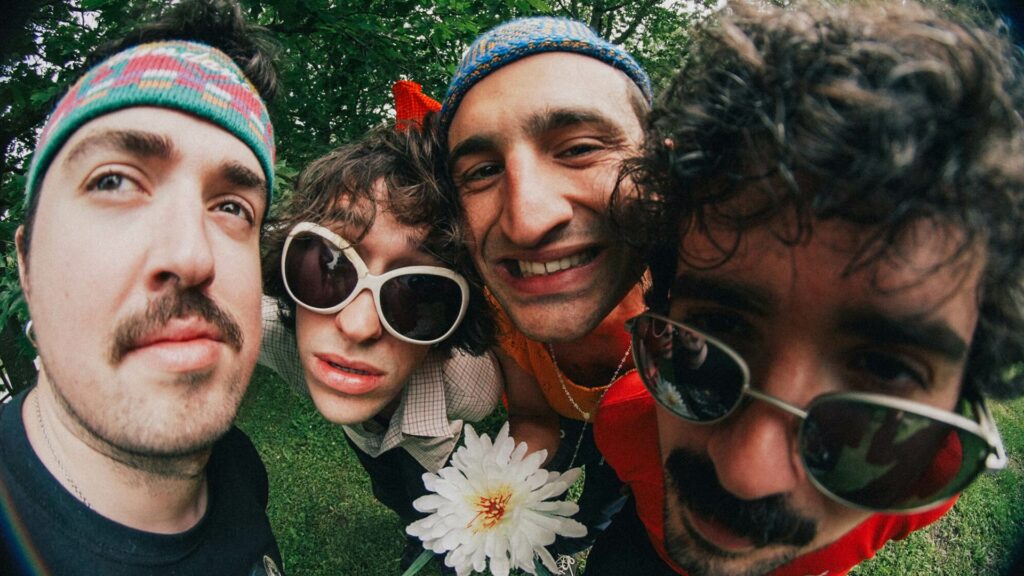I’m sat inside this bar. It’s called Narin. You can find it right in the centre of Barcelona just off Plaza Universitat on a street called Carrer Tallers. It is a lovely place to have drinks in, I must say. But I think you’d find the owner that bit more interesting than the drinks his bar serves. His name is Gani Mirzo. A musician born in Rojava who has humbly lived in Spain for the past 31 years. He has spent the last five years of his life saving other people’s lives through a diligent hand and the power of music – he is the founder of the music school Mirzo Music Foundation in Syria to help those wounded by the war.
To start off – who is Gani Mirzo? How would you describe your place in this world?
Gani: It’s funny because yesterday I spoke about this with a girl. She was asking me about my place and my music. I consider I am just another person who forms part of this world. When you’ve displaced your home from one place to the next, home adopts a different meaning and the term becomes mixed up. You get to meet so many people from different countries, and I just feel like someone who forms part of the world. This doesn’t leave out the fact that I come from a humble family. A humble city. And a big musical energy. I have had to be raw not to forget that I come from a Kurdish family.
You are Kurdish by birth and currently live in Barcelona, where you run your own bar Narin. What has lead you here until now?
Gani: When I finished school, I attended musical studies for two years. I wanted to carry on studying music, but there weren’t any Conservatories in my country. So I got offered quite a few grants in Germany. But, I wasn’t interested because they only specialise in classical music, which I wasn’t impelled to. I was more attracted to Spanish music. Flamenco and Jazz styles, which I was closer to whilst studying at school. So I went to Madrid first and then Barcelona – where I studied Flamenco and Jazz for 10 years in the Conservatory Liceu. I then started up my own restaurant here as a way of life – but music has always been my main drive. Most artists who dedicate their passions to cinema, art and music sometimes can’t live off this. This bar is for me to survive. Many musicians are lucky and can dedicate their time to teaching, but that has never been the case for me.
The fact that you play a fusion of Kurdish and Eastern music, as well as Flamenco and Jazz, is intriguing. What is the relationship between the different styles? How have you come to combine them?
Gani: There is an interesting proximity between the styles, especially between the Kurdish and Flamenco flavours. You’ll notice that if you go back to their roots, there is a connection there. They share a lot of similarities. When I started discovering their closeness, I was over the moon. It brought me great happiness to work with. This also made it easier for me to compose my own music, as their intertwining airs gave me a new sense of energy to write with.
As far as I understand, within the Kurdish community, their music and culture were banned in Rojava and Syria. Could you elaborate on what this meant? And did it affect you?
Gani: Yes, all Kurdish music and its culture were banned in Syria until 2011 during the Arab Spring. When the Kurdish regained control, centres to study music started reemerging. But yes, all literature and writing in Kurdish was not allowed before. Now that the Kurds have finished with ISIS, their territory is finally theirs, and they can make their own decisions. That’s why, today, you can find a lot of music Institutes there, where they learn their own folkloric sound. It is a culture that has never had the liberty to flourish due to having always been banned.
So, what is the Mirzo Music Foundation? How did it start?
Gani: In 2018, I collected up to 400 instruments through several fundraising schemes to bring to my hometown in Syria during wartime. But to the Kurdish territory – the war opponents. We did this to help cultivate the culture. This is how the foundation started because I remember visiting refugee camps in between 2013 and 2014 when I returned to my town, which was a big shock. I wanted to collaborate and see what I could do. I first recorded a CD named “Campo Domiz” to collect money for the refugees. After a while, I realised they needed more than money or food. So that’s when I decided to create a campaign to collect instruments. They didn’t have any access to them, and they are very expensive. So we brought violins, guitars, cellos, amps, cables, microphones, everything.
From these fund-raising schemes, how did Mirzo Music become a school?
Gani: So I got in touch with Shingal. That’s where the foundation is based. In 2014 ISIS invaded Shingal, where they decapitated many people, kidnapped many women and sold girls as sexual slaves. More than five thousand females had been abused. So, when I brought over these instruments back in 2018, I realised that something much bigger would be needed to make a change. We needed to create a school for these children, these orphans, those who’d been taken by ISIS. To heal from the damage. So many people have been psychologically damaged from the war and need a way to find themselves again. To find that inner confidence in themselves which had been lost in the darkness of the war. So I made this school with the idea of working towards a way to heal people. ISIS killed the art in the country and I saw this also as a good way to welcome artists back into our culture.
This is quite a significant project to be responsible for. Have you ever had any doubts about the outcome? Or any problems which demotivated you?
Gani: There are always problems to encounter, to be honest. The journeys to get there especially. But, personally, what drove me the most was this terror. There was no way I would let my culture be wiped out, so I faced this terror to fuel the aim of saving people’s lives. I’ve also had a lot of encounters with financial difficulties. There are a lot of bills that need to be covered, and my capabilities are certainly limited. For example, this bar (Narin) that I run finances 75% of the foundation.
You’ve helped many people who the war has damaged get through their worst nightmares – thanks to music’s honest helping hand. How do you think you’ve made a change in their lives? What sort of process has it been?
Gani: When we first started the project and were getting the teachers together, we expected about 10 people to show up. But the day we officially opened, do you know how many people turned up? Nearly 160 people! It gave me so much hope when I saw this! I remember kids who arrived at twelve years of age who had been through the worst imaginable, that are now nearly in their twenties and have improved significantly. Kids who now play gigs and are making music. It has helped these children have a better life. Because not only were some of them kidnapped, but they all had to flee their homes and return to some kind of ghost town. This has an incredibly hollowing impact to one’s energy and mind. So our school has become a sort of oasis for them. They come to sing and dance. To get back in touch with their ancestors’ music to bring normality back into the zone. It is great to bring food and money to help. But people sometimes forget that bodies are not only fuelled by energy (food), but they are also dependent on the mind. A mind that needs to be flourishing.
Mirzo Music has helped people in many different ways. As you’ve mentioned, they attend to learn instruments. Learn music. Learn the artistic manners of expressing themselves in order to find who they are once again. It is not only an open school for those who want to learn but a space for those who need a place to hang out and be a part of a community. Aside from this place being a sort of meditation zone. Have you had any specific cases you’d like to share?
Gani: There was a girl who first arrived when she was 10. There was a night she got a psychological shock due to the loud gunshots. When they fled from their home, she didn’t know what was going on. They returned back to their land in 2017 when it was once again free. And this girl was damaged. She would break plates and glasses. She would have mental breakdowns; she was in a state. One day the parents came and asked me for help. So I told them to bring her in. She was in awe of the school because it was full of instruments and art around the walls. She was not accustomed to these sort of environments. Her whole face lit up, she suddenly looked very happy, and I remember she chose to start learning the violin. One day she saw these paintings in the school and asked if she could bring her own in. So she did. And we put them up on the walls, which made her so proud of herself. Such a change in her psychological manners. She now dedicates her time to learning sheet music and playing the violin live at concerts. Her parents came back a few months later and said they didn’t recognise her! They asked me what I’d done with their daughter! I mean, I could give you many, many different cases. And this is what makes me proud. To see a shift in everyone that comes for help. Those who’ve been through terror and use music as a way out of it.
Have any of your students taken music more seriously by forming a band or a career out of it?
Gani: Yes, of course! As a school, we have a big band with 40 members. But when they perform, only a few of them will play. In fact, a few months ago, I got offered to play in Germany at the Goethe. They were so grateful for everything we had done and it was a pleasure to meet them. They organised various different concerts and chose four or five students from Mirzo Music to go and play. Various of ours have also played in a series of spots around Iraq. I think it’s amazing because I know that they are worth the listen. They are talented, and you can hear the chaos and the disaster in their sound.
Moving forward, how do you see the Mirzo Music Foundation’s future? Do you have any goals or ideas about where you want it to go?
Gani: We really want to expand to other countries and find more people who we could help. Staying put is not an option. We want to find other troubled war locations to help them. To help these people unburden themselves. There are many people out there who are willing to donate instruments to our foundation. We have the opportunity to do this on our website. Our future plan is to basically carry on making a difference, and I want nothing more than to make people smile in return because my religion is art and simply to be part of other people.
A documentary “Harmony”, about Mirzo Music Foundation, has just been released and is going to be premiered this August in Germany. It showcases the experiences of those who’ve re-found themselves through this school – falling back on the power of music to help them. It validates what these efforts have been sculpted into. Gani Mirzo believes that art isn’t just about exposing yourself and showing what you are capable of. It is about allowing it to save people’s lives. In whatever manner one wants it to mean.
Next story


